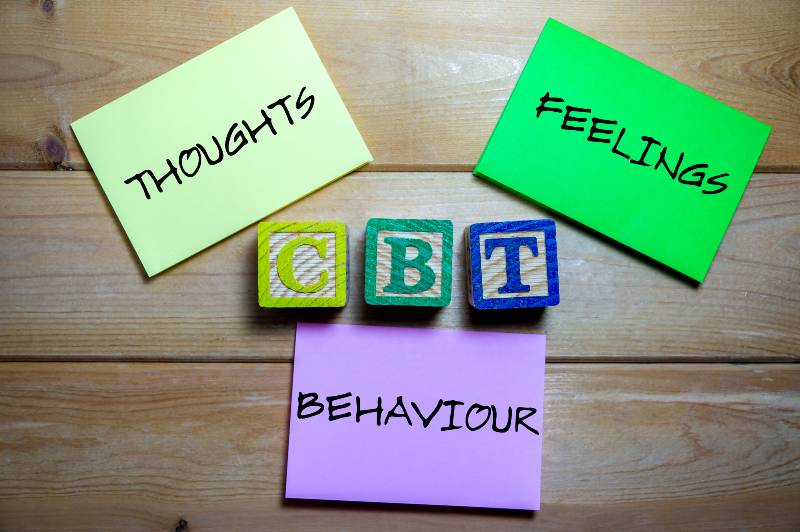CBT | It is common for many to feel anxious or nervous during a public performance or social get-together.
While it can be a normal response for those who experience it occasionally, it can be an indication of an underlying mental health condition (called social anxiety disorder (SAD) or social phobia) for those who experience it more frequently.
SAD is a common disorder with a lifetime prevalence of up to 12 percent in the United States. Typically, the symptoms of SAD first appear in childhood and adolescence, which may lead to mental health problems such as substance abuse and major depression.
If left undiagnosed or untreated, this disorder is also known to impair cognitive functions and adversely affect the quality of life.
RELATED: 7 Fun Art Therapy Ideas To Help You Relax
CBT Can Help Manage Social Anxiety Symptoms
Identifying Social Anxiety

Social anxiety is characterized by extreme and persistent feelings of nervousness, worry, and dread, which either appear in social situations or when thinking about facing social situations.
Typically, SAD may make one:
- Believe that they would end up in an embarrassing situation
- Very sensitive towards what others would think about them
- Feel self-conscious with others around
- Worried because they think that people would laugh or reject them if they try to befriend anybody
If you notice any of these key signs in you or someone you know, it is time to see a therapist.
Role of CBT in Managing SAD

Research studies have highlighted the efficacy of cognitive-behavioral therapy (CBT) in helping relieve a social anxiety disorder.
According to a study conducted by researchers from the University of Zurich, the successful treatment for an anxiety disorder involves changes in the key brain structures responsible for processing and regulating emotions. The stronger the changes, the better the treatment outcome.
Talking about the role of psychotherapy, the researchers said, “Psychotherapy normalizes brain changes associated with social anxiety disorder.”
How Does CBT Work?

CBT has been reported to be the most efficacious psychotherapy for treating SAD. CBT for SAD involves the identification and correction of maladaptive cognitions associated with social situations.
During a CBT session, the therapist works with the patient like a coach. They present the patient with a learning opportunity and guide them on how to interpret the situation and behave accordingly.
As treatment progresses, the patient is exposed to his fears and is provided with the confidence to cope with them.
CBT approaches targeting specific maintenance factors or vulnerabilities of SAD patients be more effective in the treatment of social phobia.
In one of the CBT approaches, a patient, who was scared of the thought of bothering others, thinking that she was not intelligent enough to be the center of the attraction, was asked to perform several similar tasks targeting her weaknesses.
For example, to target the reluctance to inconvenience others and be the center of attention, she was asked to interrupt a group of people in a restaurant to practice a toast for a maid of honor speech.
Similarly, to target her fear of being unintelligent, she was asked to request strangers in a bookstore to read the back cover of a book because she did not know how to read.
In simple words, CBT can help people with SAD identify negative thought patterns and replace them with positive but realistic affirmations.
For example, a patient would learn to replace “Oh my God! I don't fit here” with “I may not enjoy much here, but I needn't think much about it.” Another example would include replacing “Others in the house are expecting me to do something wrong” with “People have their eyes on me but come on, I have other things to attend to.”
CBT also helps individuals develop coping skills to manage anxious feelings and other related physical symptoms that appear in social situations.
CBT can be administered in both group and individual therapy settings. Group therapy has been a traditional approach involving two therapists helping a group of four to six patients during a half-hour session through 12 weeks.
In the individual treatment format, an individual patient is addressed with sessions lasting 60 minutes every week or fortnight depending on the severity of symptoms and personalized factors.
The patients are required to attend the sessions for up to 15 weeks. Group CBT is advantageous in the sense that it provides the patients with actual exposure to social situations that can help them get over their social anxiety woes.
CBT is Available Near You

People with SAD experience different symptoms and responses to social situations, which means they need an individualized CBT approach.
Medical Concierge can help you get effective anxiety treatment in California. To know more about social anxiety disorder treatment plans, call us today on our helpline number 877-636-0042.
Article Source: https://EzineArticles.com/expert/Susan_Navarez/2192918
Up Next:
- 9 Amazing Chicory Root Benefits You Need To Know
- 13 Food To Eat and Avoid When You Are Over 50
- Best At Home Testosterone Test and When to Consider Taking The Test
If you’ve got the gift of keeping healthy and sharing this knowledge through writing, click here if you want to write for us.
Please stay connected with us on Facebook, Pinterest, Instagram, and Twitter. Join our community here and Feel Better, Look Better and Live better with us.
Article Source: http://EzineArticles.com/
Trending
Tongue Color | 7 Scary Tongue Color Meanings
Lecithin Benefits and Side Effects: 10 Surprising Truths
Get Updates
SIGN UP FOR OUR NEWSLETTER TODAY

Tongue Color | 7 Scary Tongue Color Meanings

10 Erectile Dysfunction Exercises to Keep Your Manhood Healthy

Related

Tongue Color | 7 Scary Tongue Color Meanings

